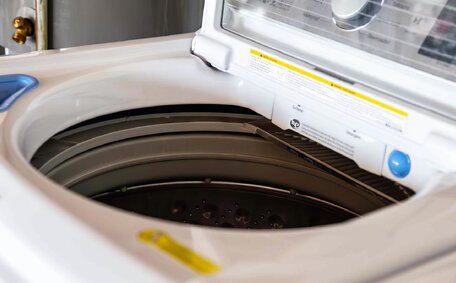What causes brown water in hot water systems?
Mineral sediment buildup, particularly iron and manganese, is a frequent cause of brown hot water. These deposits accumulate in water heaters and pipes over time. Heating water in your home’s system can disturb this sediment, potentially leading to brown or discoloured tap water.
Other common factors affecting your water heater include:
- Water heater decay causes rust in pipes and water, potentially also adding to scale buildup.
- Bacterial growth inside the unit or pipes
- Leaks in pipes and fittings, which may introduce rust or sediment into your water system.
- Municipal supply disturbances that can stir up sediment.
Issues such as discoloured cold and hot water can arise from aging, rusty pipes, or excessive scale and mineral deposits due to hard water. The sacrificial anode rod inside the water heater can also corrode over time, which can cause water discoloration.
We recommend, in most cases, draining and flushing the water heater along with thoroughly flushing household taps to help get rid of sediment causing discolored hot water. If your brown water issue continues, acknowledging that hot water can reveal underlying problems, consult a licensed plumber to examine and maintain the hot water system in use.
Health risks associated with brown tap water
Brown water that is hot to the touch often signals an underlying plumbing problem and raises important questions about the cause and associated health risks. Discoloured water can contain harmful contaminants like bacteria, parasites, lead, copper and other heavy metals that can create dirty tap water and cause illness if ingested.
Some key health implications of brown water include:
- Gastrointestinal issues like nausea, vomiting, diarrhoea
- Respiratory problems if tiny air droplets containing contaminants become airborne from showering
- Skin irritations or rashes from bathing
- Kidney or liver damage from heavy metal exposure
Although rusty water points to aesthetic concerns from corroded pipes, confirming tap water safety and investigating the underlying cause of contamination is imperative. When brown water coming out of your taps remains an issue, it signifies corrosion and likely water heater failure where addressing the problem can necessitate a new heater.
For safety and to prevent potential water stains, avoid using brown or discoloured tap water for drinking or culinary purposes until the cause has been verified. If the brown water problem persists, quickly contact a professional plumber for repairs. For the health and safety of your household, it’s crucial to have clean water available at all taps.
Testing methods to pinpoint the root cause
Assess the clarity of both cold and hot water from multiple outlets to determine if the problem lies with your system or the municipal supply.
- Run kitchen and bathroom hot taps for about 30 seconds each to observe water clarity. Take note if the discoloration appears with hot water only, showing a brown to yellow hue from water your tap, or if it affects your cold water as well.
- Inspect your garden tap and other external taps too, to identify when water comes through appearing brown, whether it’s from household plumbing or the main water lines.
- Run water for 2-3 minutes to flush out sediment; clear water suggests sediment was the issue.
- Collect water samples from multiple taps and compare appearance and clarity side-by-side.
If your testing confirms hot water brown in colour from hot water lines only, faulty pipes, mineral buildup or a failing water heater are likely to blame. For issues with discolored water flowing out your taps or persistent issues, it’s time to call a professional; contact Oatlands Plumbing to investigate further with advanced diagnostics.
DIY troubleshooting steps
Inspect all fixtures and faucets
Run hot and cold taps in the kitchen and laundry, areas commonly affected by rusty pipes, for at least 30 seconds to assess water clarity.
Look for an initial sediment or rust discharge that clears with time. Begin by examining all hot and cold water outlets at home for signs of brown water discharge.
Ask neighbours if they have issues
Talk with neighbors to see if discoloured water is a shared problem, suggesting main water line issues. This can assist in ascertaining if it’s a singular problem or tied to issues with your water supply network.
Flush out the water heater
Draining and flushing your hot water system as regular maintenance helps remove minerals like iron and manganese. In some cases, this simple maintenance step clears up the brown water straight away.
Check water heater components
Inspect your internal water heater fittings and the sacrificial anode rod. If there is substantial corrosion, this may suggest iron or manganese presence and tank lining failure, requiring replacement. Also, Use the TPR valve to flush out hot and cold water, clear blockages and ensure water safety.
Should discoloured hot water persist, consider consulting Oatlands Plumbing for a professional diagnosis and repair.
When professional help is needed
It’s time to call in the experts from Oatlands Plumbing if you have persistent brown water even after trying DIY troubleshooting, or if the issue seems to originate from the main water lines.
Contact us if:
- Discoloured water persists for more than a few hours
- Flushing brown water tap outlets and draining the water heater doesn’t resolve issues, it’s time to investigate further if problems with both hot and cold taps persist
- The problem affects both hot and cold water taps, indicating water flow issues related to your local water main
- Multiple households on your property have brown water
- You find leaks, cracks or excessive corrosion in pipes
- There are underlying water pressure or flow rate problems
Our expert team can help by performing advanced diagnostics to pinpoint the root cause, such as:
- Water quality testing
- Underground pipe inspections
- Sewer video investigations
- Pressure testing
- Water heater inspections
- Locating external pipe leaks
For ongoing issues with discoloured or dirty hot water, reach out to Oatlands Plumbing at 1300 349 338 or jobs@oatlandsplumbingservices.com.au. Our licensed plumbing technicians serve the greater Sydney area, providing expert service.
Preventing future brown water issues
Flush hot water systems annually
An annual drain and flush of your hot water heater removes sediment that can cause discolouration and dirty water. Follow manufacturer guidelines to safely empty out mineral deposits before they can stir up and discolour the water.
Consider installing a water softening system
Water softeners reduce scale buildup by removing minerals such as calcium and magnesium, while maintaining water quality. Softened water prevents these deposits in your water pipes that can come loose and cause brown water over time.
Check anode rods
Annually inspect the metal anode rod in your water heater.
Update old plumbing
Hire a licensed plumber to replace outdated galvanized pipes or fittings prone to corrosion. Modern copper and PEX pipes can resist corrosion better. Schedule an inspection to identify problem areas early.
Practising preventative maintenance and staying vigilant for early signs of wear in your plumbing system reduces the chances of brown water occurrences in future. Contact Oatlands Plumbing if you have any persistent water quality issues requiring professional help.






